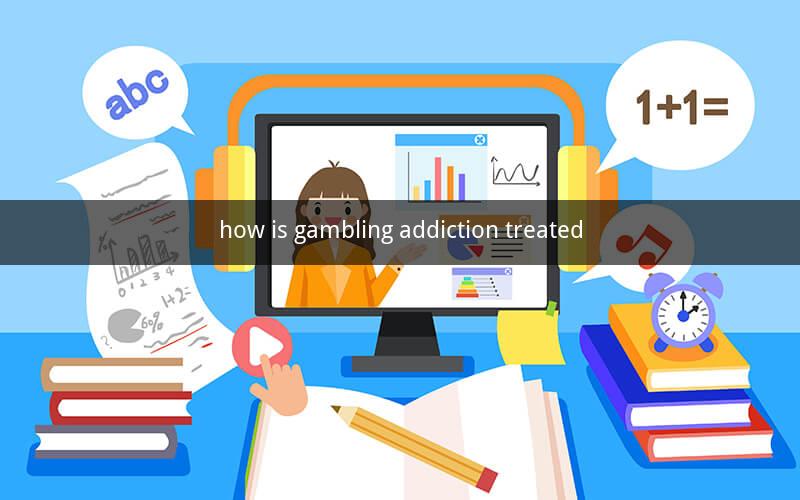
Table of Contents
1. Understanding Gambling Addiction
2. Recognizing the Signs of Gambling Addiction
3. The Importance of Professional Help
4. Therapeutic Approaches to Treating Gambling Addiction
- Cognitive Behavioral Therapy (CBT)
- Contingency Management
- Family Therapy
- Support Groups
5. Medications Used in Treating Gambling Addiction
6. Holistic and Alternative Treatments
7. Aftercare and Relapse Prevention
8. The Role of Technology in Treating Gambling Addiction
9. The Challenges and Success Rates of Treatment
10. Conclusion
1. Understanding Gambling Addiction
Gambling addiction, also known as pathological gambling, is a behavioral disorder characterized by an individual's inability to control their gambling behavior despite the negative consequences it may have on their life. It is a complex condition that often involves psychological, social, and biological factors.
2. Recognizing the Signs of Gambling Addiction
Identifying the signs of gambling addiction is crucial for early intervention. Common signs include:
- Preoccupation with gambling, which can lead to neglecting other responsibilities and interests.
- Repeatedly trying to stop or control gambling but being unsuccessful.
- Increasing the amount of money or time spent on gambling to achieve the desired excitement.
- Feeling restless or irritable when attempting to cut down or stop gambling.
- Returning to gambling with the intention of winning back money or relieving a feeling of guilt.
- Lying to family, friends, or therapists about the extent of gambling.
3. The Importance of Professional Help
Professional help is essential for treating gambling addiction. Therapists, counselors, and addiction specialists can provide the necessary support and guidance to overcome this disorder.
4. Therapeutic Approaches to Treating Gambling Addiction
a. Cognitive Behavioral Therapy (CBT)
CBT is a widely used therapeutic approach that focuses on identifying and changing negative thought patterns and behaviors associated with gambling addiction. It helps individuals develop coping strategies and improve problem-solving skills.
b. Contingency Management
Contingency management is a behavioral therapy technique that uses rewards and incentives to encourage positive behavior changes. This approach is particularly effective for individuals who have difficulty maintaining motivation to change.
c. Family Therapy
Family therapy can help improve communication and support within the family unit. It can also address the impact of gambling addiction on family members and help them develop strategies to cope with the disorder.
d. Support Groups
Support groups, such as Gamblers Anonymous, provide a safe and supportive environment for individuals struggling with gambling addiction. They offer a platform for sharing experiences, learning from others, and gaining strength in the face of challenges.
5. Medications Used in Treating Gambling Addiction
While there are no medications specifically designed to treat gambling addiction, some medications may be prescribed to address co-occurring mental health disorders, such as depression or anxiety.
6. Holistic and Alternative Treatments
Holistic and alternative treatments, such as yoga, meditation, and acupuncture, may complement traditional therapeutic approaches. These treatments can help individuals manage stress and improve overall well-being.
7. Aftercare and Relapse Prevention
Aftercare is an essential component of treating gambling addiction. It involves ongoing support and monitoring to help individuals maintain their recovery and prevent relapse. Strategies for relapse prevention include identifying triggers, developing coping skills, and maintaining a strong support network.
8. The Role of Technology in Treating Gambling Addiction
Technology can play a significant role in treating gambling addiction. Online therapy, apps, and websites offer a variety of resources, including self-help tools, educational materials, and support groups.
9. The Challenges and Success Rates of Treatment
Treating gambling addiction can be challenging due to the complexity of the disorder and the individual's resistance to change. However, with the right combination of treatments and support, many individuals can overcome their addiction and lead fulfilling lives.
10. Conclusion
Gambling addiction is a serious condition that requires comprehensive treatment and support. By understanding the signs, seeking professional help, and engaging in various therapeutic approaches, individuals can overcome their addiction and regain control of their lives.
Questions and Answers
1. Q: Can gambling addiction be cured?
A: While there is no guaranteed cure for gambling addiction, it can be effectively treated and managed through a combination of therapy, support, and self-help strategies.
2. Q: Are there any medications specifically for gambling addiction?
A: There are no medications specifically designed for gambling addiction. However, some medications may be prescribed to address co-occurring mental health disorders.
3. Q: How long does it take to recover from gambling addiction?
A: The length of time it takes to recover from gambling addiction varies from person to person. Some individuals may experience rapid improvement, while others may require ongoing support and treatment.
4. Q: Can family therapy help with gambling addiction?
A: Yes, family therapy can be highly beneficial in addressing the impact of gambling addiction on family members and helping them develop coping strategies.
5. Q: Are support groups effective for treating gambling addiction?
A: Support groups, such as Gamblers Anonymous, can be a valuable resource for individuals struggling with gambling addiction. They offer a sense of community and support.
6. Q: Can technology help in treating gambling addiction?
A: Yes, technology can play a significant role in treating gambling addiction, providing access to resources, support, and self-help tools.
7. Q: What are the signs of a relapse in gambling addiction?
A: Signs of a relapse may include increased preoccupation with gambling, neglecting responsibilities, and lying about gambling activities.
8. Q: Can stress cause a relapse in gambling addiction?
A: Yes, stress can be a trigger for relapse in gambling addiction. Learning coping strategies for stress is an important part of maintaining recovery.
9. Q: How can individuals find a therapist specializing in gambling addiction?
A: Individuals can seek referrals from their primary care physician, mental health professionals, or support groups. Online directories and professional organizations can also be helpful resources.
10. Q: Can gambling addiction lead to other mental health issues?
A: Yes, gambling addiction can co-occur with other mental health issues, such as depression, anxiety, and substance use disorders. Identifying and treating these conditions is crucial for overall recovery.